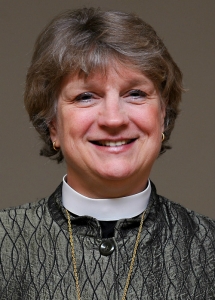 By Bishop Ann Svennungsen
By Bishop Ann Svennungsen
As a kid I would never have imagined that Lutheran Church would play such a key role in the ecumenical movement. We weren’t especially ecumenical in Shelby, Montana. And yet, before I entered fourth grade, Lutherans were beginning to lead.
I’ve always imagined that the more mainline churches would take the lead: Congregationalists, Presbyterians, or Methodists. But, perhaps our liturgical and sacramental understandings made Lutherans distinctively equipped to encourage ecumenism from the “middle of the road.”
Whatever the reason, Lutherans have developed full communion agreements with six denominations: Episcopal, Moravian, Presbyterian, Reformed, United Methodist, and United Church of Christ.
“I was surprised at the leadership role of Lutherans in the ecumenical movement.”
What is more, Lutheran-Catholic dialogues began in 1967, only two years after the Second Vatican Council concluded. The dialogues have continued until this day – authoring 11 different reports about the basic issues that separate and unite the two churches.
Only 12 years after Vatican II, Minnesota’s Lutheran and Catholic bishops began meeting together at an annual retreat, convened by ALC District President David Preus, LCA Bishop Herbert Chilstrom, and Archbishop John Roach.
I JUST RETURNED FROM the 42nd such retreat. Luther Seminary Professor Dirk Lange led participants in a review of the impact of 52 years of dialogues. Again, I was surprised at the leadership role of Lutherans in the ecumenical movement.
Last March, on the 20th anniversary of the Lutheran-Roman Catholic 1999 Joint Declaration on the Doctrine of Justification (JDDJ), delegates from all five communions who have affirmed JDDJ met and issued the Notre Dame Consultation Statement. (The World Methodist Council affirmed JDDJ in 2006; the Anglican Communion in 2016; and the World Communion of Reformed Churches in 2017).
At our last conference of bishops meeting, we heard hopeful updates about ongoing ELCA dialogues with the African Methodist Episcopal Church.
“Perhaps our liturgical and sacramental understandings made Lutherans distinctively equipped to encourage ecumenism from the ‘middle of the road.’”
It’s pretty amazing to see what ecumenical fruits have been born by the leadership of Lutherans. Oh, a sticking point for me in the Lutheran-Catholic dialogs – as you could easily predict – is the issue of women’s ordination.
But, recently, I was given a new glimpse of hope. A Catholic priest said to me: “Jesus said, ‘You will know them by their fruits.’ We are seeing the fruits of the Spirit in the churches around us through the leadership of women as bishops and pastors. Who knows what that might mean for our future?”
Yes, for many reasons, I give thanks for the Spirit’s fruits born through the ministries of all our synod’s rostered leaders. Today, I give thanks for one more.
